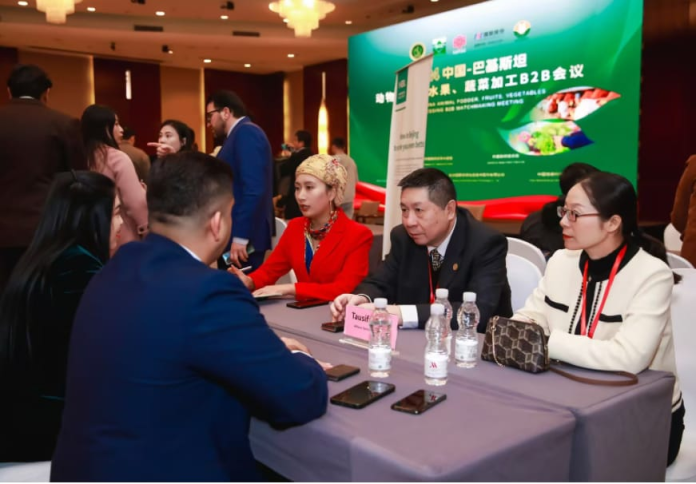BEIJING, Nov.27 (DNA): The Embassy of Pakistan in China here hosted a China-Pakistan B2B Conference focusing on animal feed, fruit and vegetable processing industries, aiming to enhance economic cooperation and investment ties between the two countries.
With the participation of over 200 representatives from business groups in Weifang, Qingdao, Karachi, and other cities in China and Pakistan, the meeting witnessed the signing of 13 MoUs worth RMB 250 million, ranging from importing citrus, seafood, animal feed from Pakistan to China, to establishing joint ventures in Pakistan, China Economic Net (CEN) reported on Wednesday.
Pakistani representatives provided detailed insights into the investment potential of Pakistan’s animal feed and fruit and vegetable processing industries.
Several incentives for foreign investors were highlighted, including 100% foreign ownership, unrestricted profit and dividend repatriation, and zero import tariffs on factory equipment and machinery.

According to Ghulam Qadir, Commercial Counsellor at the Embassy of Pakistan, Pakistan’s competitive advantages in tariffs, labor costs, and raw materials could increase profit margins for businesses by up to 4.6% in fruit and vegetable processing.
In the animal feed sector, particularly in the production of additives and supplements, profit margins could rise by as much as 3.6%.
He emphasized that the Pakistani government is committed to creating a more business-friendly environment and has already addressed issues such as remittance challenges faced by Chinese companies.
Mian Saeed Ahmed Fareed from Legend International Pvt. Ltd., a Karachi-based seafood exporter to China, told CEN reporter he is delighted to reach an agreement with an importer in Tianjin, China to export aquatic products to China.
“After covid, our volume of export to China has been going up to about 700-800 metric tons of seafood annually including cuttle fish, squid, ribbon fish, croker, etc.
In recent several years, the demand for seafood in this vast market Is increasingly diversified, ” he said.
A representative from a fodder company based in Weifang, an agricultural hub of China, highlights the potential in bilateral markets, technology transfer, and raw material trade.
“The low labor and machinery cost in Pakistan provides us with opportunities for cooperation,” he said.
Ms. Tang Yaping, Director of the Tea Industry International Department, China Association for the Promotion of International Agricultural Cooperation revealed that her association is planning to bring a delegation of Chinese tea companies to visit Pakistan for the establishment of joint processing plants and warehouses.
Zhu Qianqiu, President of Cross-Border Trade Development Committee, China told CEN that his Committee is pushing for the establishment of a zero-tariff zone in Pakistan for the trade of bilateral commodities.
It is learned this is the third sectorwise Pakistan-China B2B meeting this year, with the first held in Qingdao for fishery companies, the second in Guangzhou in footware, and the fourth to take place in Suzhou in December.

















